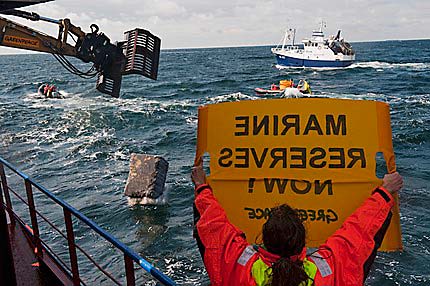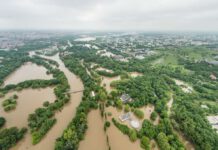
Brussels/Sweden — Greenpeace activists sailed into Swedish waters today and began placing up to 180 granite rocks, each weighing between 0.5 and 3 tonnes, on the seabed in order to prevent bottom trawling in areas listed for European Union protection.
The areas, Fladen and Lilla Middlegrund in the Kattegat, are listed by the Swedish Government as needing protection under Natura 2000 of the EU Habitat Directive because of their unique and rich sea life
Despite this, the Government is failing to protect them and bottom trawling (3), one of most destructive forms of fishing, is common throughout the area.
“The Swedish government needs to fulfil its commitment to protect the area and put a permanent ban on fishing in Fladen and Lilla Middelgrund,” said Isadora Wronski, Greenpeace ocean campaigner.
“Throughout Europe, marine protection only exists on paper. Our seas cannot wait any longer, their survival is at stake and politicians need to take action and implement laws that will protect the life of the seas today and for the future,” she stressed.
Most European countries have done little to protect the marine sites they have designated for conservation because under the EU Common Fisheries Policy they do not have the powers to regulate or prohibit fisheries. EU fisheries law states that such decisions have to be taken at EU-level.
In 2008, Greenpeace placed 320 boulders in Germany's Sylt Outer Reef, another Natura 2000 site, which was being damaged by bottom trawling. Since the placing of the boulders, trawlers have been prevented from fishing the reef. The boulders have already being colonised by a wealth of marine life.
For a long-term solution, Greenpeace is calling on the Swedish EU-presidency to reform the EU Common Fisheries Policy, enabling responsible authorities in member states to take necessary conservation measures in all types of marine protected areas.
To stop over-fishing around the world, Greenpeace is campaigning for a global network of large, fully protected marine reserves covering 40 percent of our oceans, including the North and Baltic seas, to restore the health of fish stocks, and protect ocean life from habitat destruction and collapse. Marine reserves also make our oceans more resilient to the ravages of climate change.
Greenpeace European Unit/ 10 August 2009 www.greenpeace.org/eu-unit/








